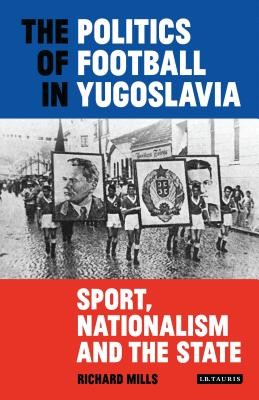
- We will send in 10–14 business days.
- Author: Richard Mills
- Publisher: Bloomsbury Publishing PLC
- Year: 2019
- Pages: 416
- ISBN-10: 1838603824
- ISBN-13: 9781838603823
- Format: 14 x 21.6 x 2.2 cm, minkšti viršeliai
- Language: English
- SAVE -10% with code: EXTRA
Reviews
Description
Even before Tito's Communist Party established control over the war-ravaged territories which became socialist Yugoslavia, his partisan forces were using football as a revolutionary tool. In 1944 a team representing the incipient state was dispatched to play matches around the liberated Mediterranean. This consummated a deep relationship between football and communism that endured until this complex multi-ethnic polity tore itself apart in the 1990s. Starting with an exploration of the game in the short-lived interwar Kingdom, this book traces that liaison for the first time. Based on extensive archival research and interviews, it ventures across the former Yugoslavia to illustrate the myriad ways football was harnessed by an array of political forces. Communists purposefully re-engineered Yugoslavia's most popular sport in the tumult of the 1940s, using it to integrate diverse territories and populations. Subsequently, the game advanced Tito's distinct brand of communism, with its Cold War-era policy of non-alignment and experimentation with self-management. Yet, even under tight control, football was racked by corruption, match-fixing and violence. Alternative political and national visions were expressed in the stadiums of both Yugoslavias, and clubs, players and supporters ultimately became perpetrators and victims in the countries' violent demise.
In Richard Mills' hands, the former Yugoslavia's stadiums become vehicles to explore the relationship between sport and the state, society, nationalism, state-building, inter-ethnic tensions and war. The book is the first in-depth study of the Yugoslav game and offers a revealing new way to approach the complex history of Yugoslavia.
EXTRA 10 % discount with code: EXTRA
The promotion ends in 23d.02:06:01
The discount code is valid when purchasing from 10 €. Discounts do not stack.
- Author: Richard Mills
- Publisher: Bloomsbury Publishing PLC
- Year: 2019
- Pages: 416
- ISBN-10: 1838603824
- ISBN-13: 9781838603823
- Format: 14 x 21.6 x 2.2 cm, minkšti viršeliai
- Language: English English
Even before Tito's Communist Party established control over the war-ravaged territories which became socialist Yugoslavia, his partisan forces were using football as a revolutionary tool. In 1944 a team representing the incipient state was dispatched to play matches around the liberated Mediterranean. This consummated a deep relationship between football and communism that endured until this complex multi-ethnic polity tore itself apart in the 1990s. Starting with an exploration of the game in the short-lived interwar Kingdom, this book traces that liaison for the first time. Based on extensive archival research and interviews, it ventures across the former Yugoslavia to illustrate the myriad ways football was harnessed by an array of political forces. Communists purposefully re-engineered Yugoslavia's most popular sport in the tumult of the 1940s, using it to integrate diverse territories and populations. Subsequently, the game advanced Tito's distinct brand of communism, with its Cold War-era policy of non-alignment and experimentation with self-management. Yet, even under tight control, football was racked by corruption, match-fixing and violence. Alternative political and national visions were expressed in the stadiums of both Yugoslavias, and clubs, players and supporters ultimately became perpetrators and victims in the countries' violent demise.
In Richard Mills' hands, the former Yugoslavia's stadiums become vehicles to explore the relationship between sport and the state, society, nationalism, state-building, inter-ethnic tensions and war. The book is the first in-depth study of the Yugoslav game and offers a revealing new way to approach the complex history of Yugoslavia.


Reviews